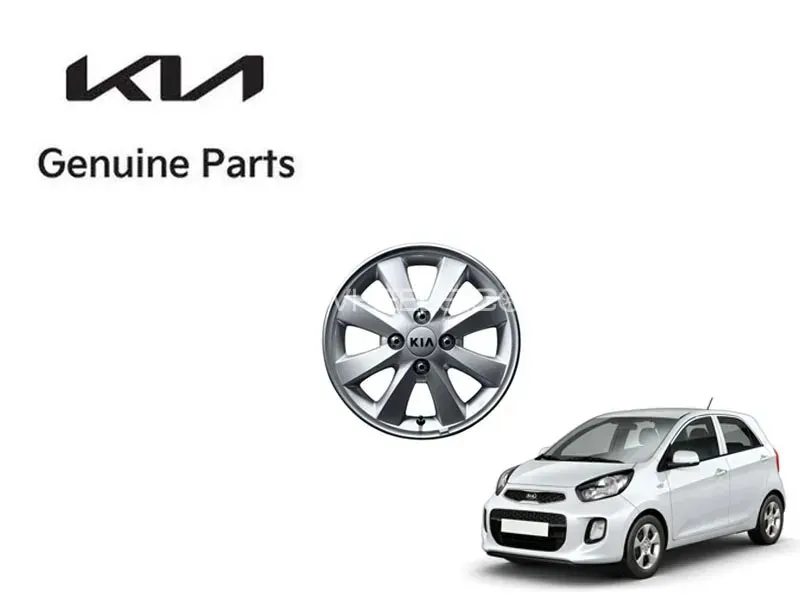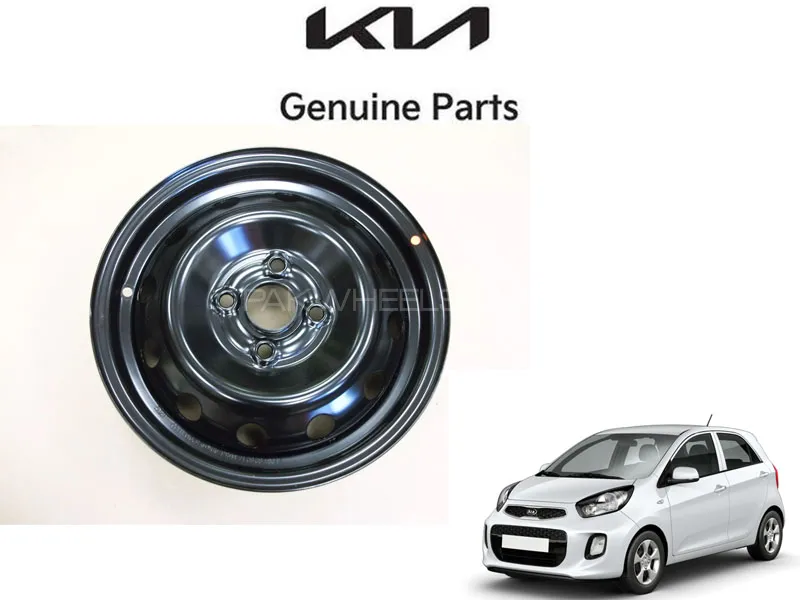Alloy rims price in Pakistan ranges from PKR 2,250 to PKR 2,000,000.
| Alloy rims Price |
| Alloy rims Price (Min) |
PKR 2,250 |
| Alloy rims Price (Max) |
PKR 2,000,000 |
Alloy rims are made up of light metals, including aluminum, magnesium, and both. Moreover, they have better performance and are lighter than steel wheels. However, their light weight means fast acceleration, fuel efficiency, and handling. They can drive away heat more efficiently than steel wheels, which can improve the lifespan of a car tire. The aluminum alloy rims are not prone to rust and corrosion quickly, and they are designed with more space between the spokes. However, the alloy wheels can crack with even the slightest bit of force.
How Do You Choose the Right Alloy Rim?
The car owners can choose the right alloy wheels for their cars by considering these factors.
Vehicle’s compatibility:
The car owners should check the vehicle’s specifications and make sure that alloy wheels and rims are compatible with the car's make, model, and year.
Size and fitment:
Car owners should determine the appropriate size and fitment of a wheel mounted on their car. They can consult the car’s manual to ensure proper sizing. The tire and wheel radius should be aligned to maintain accurate readings of the speedometer.
Improve aesthetics
Many people choose alloy rims that enhance the car’s appearance and aesthetics. They should consider factors like spoke, finish (matte, chrome, gloss), and color options.
Determine the budget:
The car owners should check the overall budget and choose an offer that aligns best with their needs
How do I know what size of alloy rims will suit my car?
To determine the right size of alloy rims for your car, consult your vehicle's owner's manual or the manufacturer's specifications. They typically provide recommended sizes of alloy rims with tyres. You can also check the existing rim size on your car's tires or refer to the placard on the driver's side door jamb, which often displays the approved rim size. Consider your driving preferences; more giant rims may offer a sportier look but can affect ride quality, so balance style with practicality. Here are the different sizes of alloy rims with their functionality. It can help consumers to make an informed decision.
The recommended alloy rim sizes by our car specialist for various new cars are as follows.
|
Car model
|
Common alloy rim sizes (in inches)
|
|
Toyota Corolla
|
15, 16, 17, 18
|
|
Honda Civic
|
16, 17, 18, 19
|
|
Honda City
|
15, 16, 17
|
|
Suzuki Alto
|
13, 14
|
|
Suzuki Cultus
|
14, 15, 16
|
|
Toyota Yaris
|
15, 16
|
|
Changan Alsvin
|
15, 16
|
|
Suzuki Wagon R
|
14, 15
|
|
Kia Sportage
|
17, 18, 19
|
Does the rim size have to match the tyre size?
Rim size should ideally match the recommended car's tyre size for your vehicle. Manufacturers specify the appropriate tyre size for a particular rim to ensure safe and optimal performance. Deviating significantly from the recommended tire size can affect handling, safety, and speedometer accuracy. While some minor variations are acceptable, it's generally best to follow the manufacturer's guidelines or consult a professional to ensure compatibility and safety.
How to read the rim size of your car's tyre?
To read the alloy rim's size of your car, look for the information on the sidewall of your tire. The rim size typically expresses itself as a combination of numbers like "15x6.5" or "17x7.0." The first number (e.g., 15 or 17) represents the diameter of the rim in inches, while the second number (e.g., 6.5 or 7.0) indicates the width of the edge. However, this information helps you select boundaries compatible with your vehicle's tire size and specifications.
|
Car alloy rims sizes (inches)
|
Typical functionality
|
13 inch alloy rims
|
Suitable for compact cars, providing economy and agility.
|
14 inch alloy rims
|
A standard size often found on sedans and compact SUVs.
|
15 inch alloy rims
|
Versatile size compatible with various vehicle types.
|
16 inch alloy rims
|
Offers improved handling and stability for mid-size cars.
|
17 inch alloy rims
|
Provides a sportier look and enhanced performance.
|
18 inch alloy rims
|
Commonly chosen for SUVs and crossovers, balancing style and functionality.
|
19 inch alloy rims and above
|
Typically found on high-performance and luxury vehicles, prioritizing aesthetics and performance.
|
Which is better: alloy, steel or aluminum?
Whether alloy, steel, or aluminum is "better" depends entirely on the specific application and the desired properties for that application. Each material has its strengths and weaknesses, making it suitable for different purposes. Here's a brief overview of when each material might be preferred:
|
Characteristic
|
Alloy
|
Steel
|
Aluminum
|
|
Strength
|
Variable, tailored for specific needs
|
High strength, durable
|
Good strength-to-weight ratio
|
|
Weight
|
Variable
|
Heavier
|
Lightweight
|
|
Corrosion Resistance
|
Depends on alloy composition
|
Requires surface treatment
|
Excellent, especially when coated
|
|
Thermal Conductivity
|
Variable, tailored for specific needs
|
Moderate
|
High thermal conductivity
|
|
Versatility
|
Tailored properties for specific needs
|
Versatile, used in various industries
|
Widely used in aerospace, automotive
|
|
Ease of Shaping
|
Variable, tailored for specific needs
|
Machinable but harder to work with than aluminum
|
Easily molded into various shapes
|
|
Fatigue Resistance
|
Variable, tailored for specific needs
|
Generally good
|
Prone to fatigue failure under cyclic loads
|
|
Pricing
|
Varies widely based on alloy composition, size, and market conditions.
|
Generally cost-effective for many applications
|
Can be more expensive on a per-weight basis; price fluctuations based on market demand and regional factors
|
Which is better, alloy or steel rims?
Alloy car rims are generally preferred for their lightweight design, aesthetic appeal, and potential performance benefits. They offer improved handling fuel efficiency and come in various visually appealing designs. On the other hand, steel rims are cost-effective and highly durable, making them suitable for rugged conditions and a smoother ride. Your choice should align with your priorities: appearance, performance, or budget considerations.
How can I clean the alloy rims of my car?
- Gather supplies: You'll need a bucket of soapy water, a soft brush or sponge, a wheel cleaner specifically designed for alloy rims, a hose or pressure washer, and a microfiber cloth.
- Preparation: Begin by parking your car in a shaded area and letting the rims cool if they're hot. It prevents soap and cleaners from drying too quickly.
- Apply wheel cleaner: Spray the alloy wheel cleaner evenly on the rims. Follow the product's instructions regarding application and dwell time.
- Brush and scrub: Use a soft brush or sponge to scrub the rims gently. Avoid using abrasive materials that can scratch the alloy surface.
- Rinse thoroughly: Rinse off the wheel cleaner and loosen the dirt with a hose or pressure washer.
- Dry: Use a clean microfiber towel to dry the rims thoroughly to prevent water spots.
How can I improve the overall car's performance while cleaning alloy rims?
Cleaning alloy rims can improve your car's overall efficiency in the following ways:
- Brake performance: Clean rims dissipate heat better, helping brakes operate efficiently and preventing brake fade.
- Aerodynamics: Cleaner rims reduce minor air resistance, slightly improving fuel efficiency at higher speeds.
- Tyre maintenance: Cleaning rims allow for better tyre inspection and maintenance, reducing rolling resistance and air leaks.
- Overall vehicle maintenance: Regular cleaning is part of vehicle maintenance, indirectly contributing to efficiency by preventing problems.
- Aesthetic maintenance: Clean rims can improve overall car care, indirectly impacting efficiency and longevity.
How do I know if my rims are alloy or aluminum?
If a magnet sticks to your wheel, it means the wheel is made of steel. If the magnet does not stick, it suggests the wheel is made of a non-ferrous material, such as aluminum. This simple test helps determine whether your wheel is steel or aluminum based on its magnetic properties. However, alloy rims and aluminum rims seem interchangeable terms. If your rims are labeled as aluminum, they are alloy rims made primarily of aluminum.
How long do alloy rims last?
According to our automotive experts alloy wheels tend to last around 3 to 10 years, a shorter lifespan than steel wheels. This is because steel wheels are known for their sturdiness and longevity, even though alloy wheels may have higher tensile strength. In practical terms, alloy wheels are more prone to damage and breakage when compared to their steel counterparts.
Where can I find affordable and best alloy rims in Pakistan?
You can find the best alloy rims at an affordable price from PakWheels, a reputable name in the automotive industry since 2003. Moreover, we offer many other automotive accessories, including wheel covers, tire valve caps, and lug nuts. Whether you're looking to enhance the appearance of your vehicle or replace worn-out components, PakWheels provides a convenient marketplace to find these accessories at competitive prices. Additionally,
- We offer a reliable payment method to assist consumers.
- You can book your order 24 hours a day and 30 days a month.
More



























